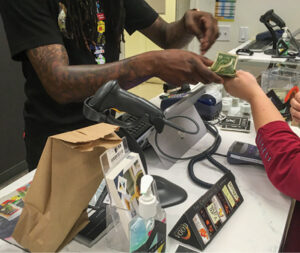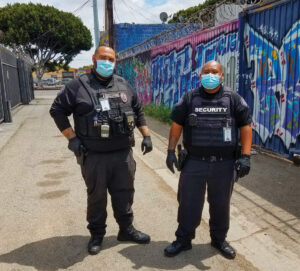Marijuana retail business owners who are willing to build an understanding with law enforcement officials and invest in security could find themselves developing a relationship that’s mutually beneficial.
Cannabis entrepreneurs will find that local police can help protect their operations and employees, while police find that familiarizing themselves with marijuana businesses makes their jobs easier and safer.
For one thing, most police departments are willing to advise licensed marijuana businesses on their security plans at no cost.
“Almost every police and sheriff’s department that I’ve ever known, if you call them and say, ‘I would like to get security advice and a security briefing for my location,’ most departments will send a police officer out to walk the property with you and give you some tips—and they’ll do that for free,” said Kyle Kazan, the founder and CEO of Glass House Brands, a vertically integrated cannabis business in California, and a former patrol officer in Torrance.
During such visits, police might share information such as their response times and which alarm systems operate best with their departments—plus tips, such as turning off motion sensors if there is a dog or cat in the room.
“Always include local police and regulators in the design process. Seek their input and their guidance,” Kazan advised.
While cannabis business owners stand to benefit from these visits, most police departments also value them.
“They don’t know if they’re going to be in a dangerous situation in your business at 2 in the morning. If they’ve actually been in your business, then they have some familiarity with it,” Kazan said.
Scare Off Robbers at Cannabis Retailers
Security experts advise cannabis business owners to solicit advice from private security companies, which will usually make a first visit to the business for free.
If a cannabis business implements good advice about alarms, cameras, lights, safes and other precautions, intruders could be gone before product is stolen, sparing the chance of a dangerous confrontation between police and intruders.
Forging good relationships with local police means not only complying with regulations but asking officers what safety and security measures they want you to take—even if those measures involve going above and beyond what’s required by regulators.

One of the best ways to deter robberies is to keep little cash on site. Photo by Kate Lavin
“We go to the police and say, ‘We know what the state and local regs want, but what do you want?’” said Tony Gallo, founder and CEO of the Sapphire Risk Advisory Group, a cannabis security consulting business in Texas.
For example, a police chief in one California town asked Gallo’s retail clients if they would put their address on the roof in 3-foot-high letters so that if a helicopter flew overhead, officers could see the address.
“It was not in the city or state regs, but we did it. And because of that, the police chief told the city council that we were very cooperative, and we won the license,” Gallo said.
Other requests Gallo’s clients have received include placing large, weighted flowerpots as barriers against cars that try to crash into stores, installing an extra entry gate, conducting police walkthroughs before new store openings and complying with specific camera and lighting requests.
“If we are asked to put weighted flowerpots in the front of your building, and that’s going to make the chief of police happy, I’m going to put flowerpots in front of the building,” Gallo said.
Beyond forging relationships with police, Kazan said that marijuana business owners are entitled to the same protection as any other company.
“You’re running a legal business. Avail yourself of those resources there—you’re paying for them,” he said. “It’s good for you, and it’s good for a lot of the law enforcement officers.”
On the following pages, cannabis security experts share the top eight considerations that marijuana businesses should keep in mind when developing a security plan for their company.
Product Management
Because diversion is law enforcement’s biggest concern with the legal marijuana market, licensed business owners should focus security efforts on product management.
According to Gallo, 70% to 80% of all product losses at cannabis businesses are internal. Therefore, business owners should focus on measures that will restrict product access within the store, such as access-control systems, cameras and safes.
“You need good inventory control,” according to Anthony Vanderhorst, security specialist for Florida-based multistate operator Jushi Holdings.
A big technology in inventory control is already mandatory in most states: seed-to-sale tracking.
“Beyond seed-to-sale, you need something deeper that checks products when they’re going out and being received,” Gallo said. “There have to be people counting at all ends.”
Access Control Systems
One critical aspect of product management is having access-control systems that limit who can enter specific areas in a building, such as product-storage areas. These include key cards and fobs, like those used in hotels to restrict access to registered guests.
“It’s very important to have a good access-control device because it limits the number of people who can enter product rooms. Access control is one of those things that is universally accepted because you want to limit access to wherever cannabis is stored, any back-of-house operations,” Vanderhorst said.
He noted that Jushi restricts access to certain areas based on job title and responsibility.

Some cannabis operators require all employees—not just guards—to attend security trainings. Photo Courtesy of Source Cannabis
“If you’re a salesperson, there’s no reason for you to go into the vault to do inventory functions. An inventory person should have access to cannabis-storage facilities, while a budtender or retail sales associate would not. So, you can restrict access that way,” Vanderhorst said.
One of the most common areas for internal product theft is the trim room, because it’s relatively easy for trimmers to hide flower unless the area is monitored with either cameras or security personnel.
Safes are another important bulwark against internal and external product theft. Some states require safes, but entrepreneurs in markets that don’t require them are advised to invest in safes in any case.
Vanderhorst also noted that it’s paramount for businesses to report any product losses to regulators, whether it be product lost to robbery, internal theft or other reasons.
“You have to explain any type of loss. There is some loss as you go through the different processing stages. All of that gets recorded, and if there are any discrepancies outside the acceptable guidelines, then it has to be reported and it will be investigated” by regulators. Vanderhorst said. “As a retailer, if you were to lose any units, you would have to report that, and that would certainly launch an investigation into your practices.”
Cameras and Lighting
Other key components to deterring internal theft as well as external robberies are cameras and lighting.
Observers say that it’s not difficult to find a camera system at a reasonable price that meets most state and municipal requirements.
Kazan suggests high-definition cameras that send footage to the cloud and have plenty of storage, since some locales require businesses to keep 30 days to two years of data.
It’s also important that cannabis businesses arrange security cameras so that sensitive areas—such as entryways to product storage—are covered from all possible angles. Additionally, there should be backup cameras so that, if one camera goes out, another can cover the area.
“It’s important to build redundancy, especially in the CCTV (closed-circuit television) realm, because that’s the piece that the regulators are looking at. They want to make sure that you’re recording at a certain frame rate, at a certain resolution and retaining for a certain duration,” Vanderhorst said.
Kazan noted that good lighting is another sensible deterrent against criminals that also inspires confidence in employees and customers.
He added that it’s useful to query security consultants or local law enforcement about how to arrange cameras and lights in the most effective manner.
Alarm Systems
Alarms and motion detectors are also fundamental parts of a cannabis security regime.
“Alarms are pretty standard. We’ve had alarm systems now for decades. It should be nice and loud; there should be lights around. And it should have a direct connection … to get law enforcement out there,” Kazan said.
“If somebody enters your store after it’s closed at 3 a.m. and there is no security there, you want to have that motion detector set off an alarm that is connected to the police. If you have the proper SOPs, you won’t lose anything. It’ll just be the damage from the person breaking in,” Kazan said. “If you have an alarm system that directly goes to security and police, and it’s nice and audible, so somebody knows they tripped the alarm, they’re going to leave fast.”
Assailants fleeing not only ends the burglary, it averts a potentially dangerous police confrontation.
Kazan also advised that business owners ensure the alarm system has a backup battery and is installed by a professional.
Handling Cannabis Deliveries
Cannabis delivery services have their own security regulations, including vehicle-mounted security devices such as cameras and GPS units, as well as separate drop safes for product and cash. States such as Massachusetts require a second employee to accompany delivery drivers.
“In a good program, the product is put into an environment that’s sealed or secured in some way. And then the product would be transferred from point A, the grow facility, to the dispensary, where that product is verified. So, really, the drivers never had access to it to begin with,” Gallo said.
Cash Management
Because they are seen as robbery targets, cannabis retailers need to have good cash-management processes in place.
“We never have a big cash buildup at the store. We take payment methods besides cash, and we don’t keep cash on-site, we move it,” Kazan said.
He explained that Glass House uses third-party security transport companies to pick up cash and get it to the bank. Such services are used in other industries, as well.
“It’s not our personnel running around with cash,” Kazan said. “I think that’s the smarter way to go. It’s a little more expensive, but it’s safer.”
Gallo said retailers can take precautions at the cash register, such as limiting the amount of cash at the store. He also recommends that clients install small cash boxes underneath registers, where workers can drop large bills such as 50s and 100s. Once a certain dollar amount is reached in the box, the cash is moved, limiting access to big bills and reducing the chances of theft.
Personnel and Training
Approaches to security personnel vary from company to company.
Glass House has 24/7 security personnel at its cultivation facilities, and the company also deploys security personnel at stores considered to be “high risk,” Kazan said.
While Vanderhorst heads Jushi’s multistate, in-house security team, he also hires third-party security firms if a location calls for it.

ETG Systems in Denver set up this security operations center, where staff can remotely monitor multiple facilities continuously. Photo courtesy of ETG Systems
Of course, just as important as whom you hire is how you train them.
“It’s important to inform your workforce,” said Vanderhorst, who created a preemployment training deck about security for new hires. The required training takes place before new employees arrive at the cannabis facility where they will be working, so that security is already top of mind.
Gallo also developed a training program that begins with creating a “culture of honesty” that highlights the risks of product theft and diversion, as well as the rewards of “doing right by the company.”
It’s also helpful to look at what other high-risk businesses—such as convenience stores, pawn shops and retailers selling firearms, liquor and tobacco—do in terms of security.
“Identify their security protocols and then develop a training module for your employees around that,” Gallo advised.
Security Costs for Cannabis Retailers
Security costs vary according to location, size and layout of the grow site, processing facility, retail outlet, delivery fleet or other business.
Gallo said the average U.S. cannabis store is 3,000 square feet. To adequately protect it with access-control systems, alarms, cameras and other equipment typically requires an investment of $60,000-$80,000.
Cultivation sites as large as 100,000 square feet typically require around $120,000 in security equipment, while bigger grows can top $200,000, Gallo said.
Average-size processing sites can run $40,000-$60,000 for security equipment, he added.
Vanderhorst estimated that a 6,000-square-foot store could easily have 30 cameras. And if a state requires retailers to keep, say, 90 days of video footage, that requires a large server that could cost up to $50,000.
“By the time you’re finished with one store, we could be talking about a quarter-million dollars. It gets expensive,” Vanderhorst said.
Omar Sacirbey is the editor of SSI’s sister publication, MJBizMagazine. The original version of this post appeared on MJBizDaily.com.
The post 8 Expert Tips to Help Cannabis Businesses Ensure Safety and Win Licenses appeared first on Security Sales & Integration.
